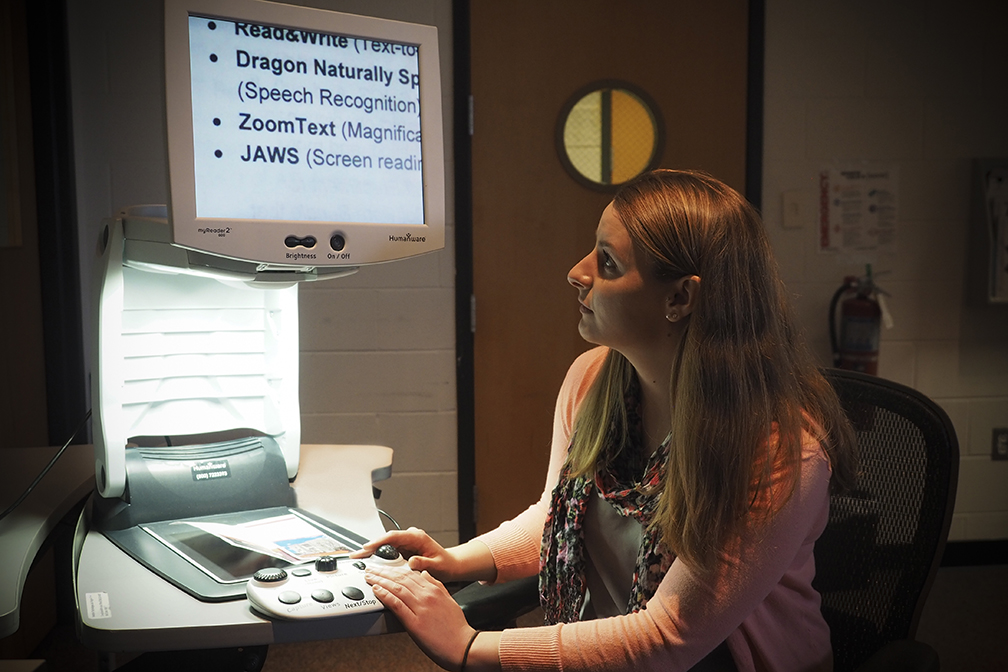Department of Science, Technology, and Society to Celebrate Its Inaugural Research Day
April 24, 2018

Stephanie Arnold had a decision to make.
The Virginia Tech junior could do a culminating project on any topic related to her Technology and Disability course. For someone studying to be a geriatric occupational therapist, the options were many. Yet she chose assistive technologies for the blind because they helped her grandmother live independently. And Arnold wanted to share the information so others could benefit from it.
Making student research meaningful beyond course assignments is a core goal of the Department of Science, Technology, and Society’s first Undergraduate Research Day, to be held April 27 in Newman Library.
“The Undergraduate Research Day will promote an awareness of what our department does — studying the social dimensions and the ethical implications of emerging science and technology,” said Daniel Breslau, an associate professor and chair of the department. “And we hope it will give our students valuable experience in presenting their work to the world.”
To help fuel the event, faculty members incorporated research projects into four departmental courses.
Students in Technology and Disability — including Arnold, who is a human development major from Newport News, Virginia — will tackle narratives about disability, rhetoric around technology, social and historical trends around disability technologies, and ethics of the body in the context of medicine.
“Students come to see resistance and counternarratives that some in the disability community hold when it comes to technological design,” said Ashley Shew, an assistant professor who teaches the course. “They come to see disability in terms of a long history of discrimination, the disability rights movement, and inaccurate media tropes that provide the dominant images of disability in our society.”
Students in the Humanities, Technology, and the Life Sciences class, taught by Rebecca Hester, an assistant professor, are using found objects to create 3-D models of ribosomes, sites of protein synthesis in living cells. The models reference the course’s examination of historical scientific and social thought, especially since the 1950s, and links this to contemporary biological and political thought.
In Lee Vinsel’s course Innovation in Context, students will present research exploring the moral and political questions surrounding three emerging technologies: CRISPR, crytocurrency, and aeroponic farming. Vinsel, an assistant professor, introduced students to current thought about the sources of innovations, their consequences, and strategies for ensuring positive outcomes.
And students in the Medical Dilemmas course of Cora Olson, a senior instructor at the Virginia Tech Carilion School of Medicine, will present projects using cultural, historical, sociological, and philosophical modes of inquiry. These projects range from cultural comparisons of the timing of death to socioracial analyses of systemic health injustice.
Project themes often intersect across courses. The gene-editing technology CRISPR, for example, is both one of the three technologies that students are investigating in Vinsel’s course and the principal topic that Maggie Rudnicki — a senior from Lorton, Virginia, who is majoring in biological sciences — is researching for her Technology and Disability class.
During the Undergraduate Research Day, students will showcase both individual and collaborative projects on the relationship of science and technology to society, culture, politics, and social change. Instead of following a traditional poster-session format, the event will take advantage of the digital technologies available in the Athenaeum, a suite of spaces and services in Newman Library that was established in partnership with the College of Liberal Arts and Human Sciences.
On April 27, from 1 to 5 p.m., screens will rotate presentations every half hour. Graduate students in the Department of Science, Technology, and Society — which is part of the College of Liberal Arts and Human Sciences — will serve as project judges.
The event is free and open to the public.
Written by Leslie King





